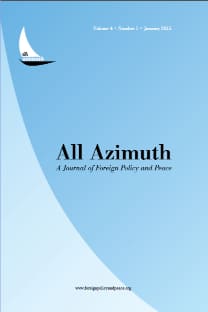The Genealogy of Culturalist International Relations in Japan and Its Implications for Post-Western Discourse
This paper aims to introduce a neglected methodology from Japanese
Keywords:
Japanese IR, diplomatic history, international cultural relations, regional history post-Western IR theories,
___
- Acharya, Amitav. “International Relations Theory and the ‘Rise of Asia’.” In Oxford Handbook of the International Relations of Asia, edited by Saadia Pekkanen, John Ravenhill, and Rosemary Foot, 120-40. New York: Oxford University Press, 2015.
- Arrighi, Giovanni . “States, Markets, and Capitalism, East and West.” Positions 15, no. 2 (2007): 251-84.
- Carr , E. H. The Twenty Years’ Crisis: 1919–1939. London: Macmillan, 1946.
- Chen, Ching-Chang. “The Absence of Non-Western IR Theory in Asia Reconsidered.” International Relations of the Asia-Pacific 11, no. 1(2011): 1-23.
- ———. “The Im/Possibility of Building Indigenous Theories in a Hegemonic Discipline: The Case of Japanese International Relations.” Asian Perspective 36, no. 3 (2012): 463-92.
- Chen, Kuan-Hsing. “Takeuchi Yoshimi’s 1960 ‘Asia as Method’ Lecture.” Inter-Asia Cultural Studies 13, no. 2 (2012): 317-24.
- Cox, Robert. “Social Forces, States and World Orders: beyond international relations theory.” Millennium 10, no. 2 (1981): 126-55.
- Fairbank, John King, and Ta-tuan Ch’en, eds. The Chinese World Order: Traditional China’s Foreign Relations. Cambridge: Harvard University Press, 1968.
- Frank, Andre Gunder. Re-Orient: Global Economy in the Asian Age. Berkeley: University of California Press, 1998.
- Goto-Jones, Chris. Political Philosophy in Japan: Nishida, the Kyoto School, and Co-Prosperity. London: Routledge, 2005.
- ———, ed. Re-Politicising the Kyoto School as Philosophy. London: Routledge, 2008.
- Hamashita, Takeshi. China, East Asia, and the Global Economy: Regional and Historical Perspectives. New York: Routledge, 2008.
- ———. “Tribute and Emigration: Japan and the Chinese Administration of Foreign Affairs.” Senri Ethnological Studies 25 (1989): 69-86.
- Hirano, Kenichiro. Kokusai Bunkaron [International cultural relations]. Tokyo: Tokyo University Press, 2000.
- Hoffmann, Stanley. “An American Social Science: International Relations.” Daedalus 106, no. 3 (1977): 41-60.
- Hook, Glenn D., Julie Gilson, Christopher W. Hughes, and Hugo Dobson. Japan’s International Relations: Politics, Economics and Security. London: Routledge, 2001.
- Hook, Glenn D., and Richard Siddle, eds. Japan and Okinawa: Structure and Subjectivity. London: Routledge Curzon, 2001.
- Hotta, Eri. Japan 1941: Countdown to Infamy. New York: Alfred A. Knopf, 2013.
- ———. Pan-Asianism and Japan’s War: 1931–1945. Basingstoke: Palgrave/Macmillan, 2007.
- Inoguchi, Takashi. “Are There Any Theories of International Relations in Japan?” International Relations of the Asia-Pacific 7, no. 3 (2007): 369-90.
- Inoguchi, Takashi, and Paul Bacon. “The Study of International Relations in Japan: Towards a More International Discipline.” International Relations of the Asia-Pacific 1, no. 1 (2001): 1-20.
- Iriye, Akira. Cultural Internationalism and World Order. Baltimore: Johns Hopkins University Press, 1997.
- ———. Shin Nihon no Gaiko: Chikyuka Jidai no Nihon no Sentaku [New diplomacy of Japan: Japan’s choice in the global era]. Tokyo: Chuokoron, 1991.
- Kang, David. East Asia before the West: Five Centuries of Trade and Tribute. New York: Columbia University Press, 2010.
- Kawata, Tadashi, and Saburo Ninomiya. “The Development of the Study of International Relations in Japan.” The Developing Economies 2, no. 2 (1964): 190-204.
- Keene, Edward. Beyond Anarchical Society: Grotius, Colonialism and Order in World Politics. Cambridge: Cambridge University Press, 2002.
- Lee, Seok-Won. “Empire and Social Science: Shinmei Masamichi and the East Asian Community in Interwar Japan.” Social Science Japan Journal 17, no. 1 (2013): 59-76.
- Murata, Koji . “The Evolution of Japanese Studies of International Relations.” Japanese Journal of Political Science 11, no. 3 (2010): 355-65.
- Nakano, Ryoko. “‘Pre-History’ of International Relations in Japan: Yanaihara Tadao’s Dual Perspective of Empire.” Millennium 35, no. 2 (2007): 301-20.
- Yaqing, Qin. “International Society as a Process: Institutions, Identities, and China’s Peaceful Rise.” The Chinese Journal of International Politics 3, no. 2 (2010): 129-53.
- ———. “A Relational Theory of World Politics.” International Studies Review 18, no. 1 (2016): 33-47.
- ———. “Rule, Rules, and Relations: Towards a Synthetic Approach to Governance.” The Chinese Journal of International Politics 4, no. 2 (2011): 117-45.
- Sakai, Tetsuya. Kindai Nihon no Kokusai Chitsujo [International order of modern Japan]. Tokyo: Iwanami, 2007.
- Shani, Giorgio. “Towards a Post-Western IR: The Umma, Khalsa Panth, and critical international relations theory.” International Studies Review 10, no. 4 (2008): 722-34.
- Shimizu, Kosuke. “The Ambivalent Relationship of Japan’s Soft Power Diplomacy and Princess Mononoke: Tosaka Jun’s philosophy of culture as moral reflection.” Japanese Journal of Political Science 15, no. 4 (2014): 683-98.
- ———. “Materializing the ‘Non-Western’: Two Stories of Japanese Philosophers on Culture and Politics in the Inter-war Period.” Cambridge Review of International Affairs 28, no. 1 (2015): 3-20.
- ———. “Nishida Kitaro and Japan’s Interwar Foreign Policy: War Involvement and Culturalist Political Discourse.” International Relations of the Asia-Pacific 11, no. 1 (2011): 157-83.
- Smith, Steve, Ken Booth, and Marysia Zalewski. International Theory: Positivism and beyond. Cambridge: Cambridge University Press, 1998.
- Suzuki, Shogo. Civilization and Empire: China and Japan’s Encounter with European International Society. London: Routledge, 2009.
- Tansman, Alan, ed. The Culture of Japanese Fascism. Durham, N.C.: Duke University Press, 2009.
- Yamamoto, Kazuya. “International Relations Studies and Theories in Japan: A Trajectory Shaped by War, Pacifism, and Globalization.” International Relations of the Asia-Pacific 11, no. 2 (2011): 259-78.
- Young, Louise. Japan’s Total Empire: Manchuria and the Culture of Wartime Imperialism. Berkeley: University of California Press, 1998.
- Zhao, Tingyang. “Rethinking Empire from a Chinese Concept ‘All-under-Heaven’.” Social Identities 12, no. 1 (2006): 29-41.
- ISSN: 2146-7757
- Yayın Aralığı: 2
- Başlangıç: 2012
- Yayıncı: Dış Politika ve Barış Araştırmaları Merkezi, İhsan Doğramacı Barış Vakfı
